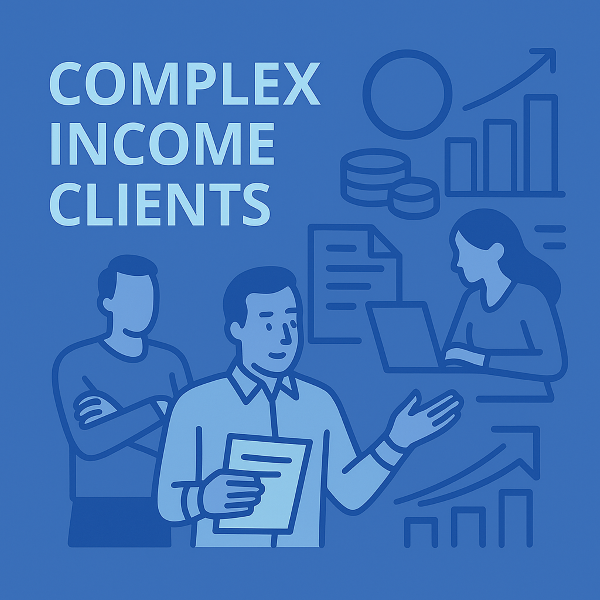Mastering Mortgages for Complex Income Clients | More clients now earn through non-traditional routes. From freelancers and contractors to directors and landlords, income is no longer simple. In light of this, lenders have responded by transforming their criteria in ways that would have been unthinkable just a decade ago.
As a broker, supporting these borrowers requires in-depth knowledge, keen attention to policy, and effective lender relationships.
This blog outlines the key challenges and how brokers can provide practical solutions that extend beyond product sourcing.
Understanding Complex Income: The New Norm
Complex income refers to earnings outside of standard salaried work. It includes, but is not limited to:
- Self-employed professionals with varying profits
- Directors drawing small salaries and dividends
- Contractors or freelancers on rolling agreements
- Landlords managing multiple buy-to-let properties.
- Individuals with overseas income or passive returns
- Employees receiving large bonuses or irregular commissions
Such clients may earn well, yet struggle with automated affordability checks. Lenders may not see the full picture without context.
Complex Income Clients – The Challenges: Why Lenders Struggle
Lenders prefer predictable, steady income. Complex income raises concern, especially when:
- Earnings vary month-to-month or over the year
- Declared income is reduced to save on tax.
- Documentation is hard to source, such as foreign payslips.
- Company accounts show mixed results year-on-year.
- Multiple income streams lack supporting paperwork.
Many mainstream lenders work with fixed rules. These may unfairly limit borrowing or result in rejections despite strong real-world affordability.
Complex Income Clients – How Brokers Can Add Real Value
1. Master the Art of Packaging
Well-presented cases improve success. Gather all relevant income proof, such as:
- At least two years of accounts, where possible
- Tax year overviews and SA302s
- Letters from accountants confirming income
- A full breakdown of all income sources
- Renewal dates and work history for contractors
- Rental income and mortgage summaries for landlords
Explain income clearly. Highlight consistency over time, even if figures shift.
2. Segment Lender Options by Policy Nuance
Lender policy varies widely. Build a matrix showing:
- Required years of trading for self-employed applicants
- Acceptance of retained business profits
- Contractor income is assessed using day rates.
- Willingness to accept income in other currencies
- Averaging methods versus the latest year-only
This detail allows you to shortlist lenders efficiently, saving time and improving outcomes.
3. Set Expectations Transparently
Clients often don’t realise they fall outside standard categories. Help them prepare by:
- Outlining which documents they’ll need
- Explaining how income will be reviewed
- Clarifying how loan limits may differ from assumptions
Managing expectations avoids delays and demonstrates your expertise from the start.
4. Champion Your Client’s Story
Numbers alone don’t show the full picture. Support the application with a cover letter that:
- Explains income trends and long-term sustainability
- Highlights career progress or contract history
- Clarifies one-off income changes, such as COVID impacts
- Reassures underwriters with context and reasoning
When you make the case personal, lenders are more likely to show flexibility.
Forward Thinking: Keeping Ahead of Trends
The self-employed now make up nearly 15% of UK workers, per ONS figures.
Mortgage demand from these borrowers will grow. Brokers must understand their needs and keep up with policy shifts.
Stay informed, continue training, and build strong relationships with specialist lenders who support income complexity.
Introducing Afin Bank
Complex Income Clients – Your Expertise is the Product
Automated tools are standard. But they can’t replace the judgment of an adviser who understands complex income.
The most valuable service is not just securing approval, it’s knowing how to structure the case properly.
For clients with unusual income, your skill can be the difference between rejection and success. Be the adviser who knows how to get the deal done—and your reputation will grow with every case.
Why Working with a Specialist Network Like Connect Makes a Difference
When it comes to complex income clients, access and expertise matter just as much as presentation, as a specialist mortgage network, Connect provides brokers with direct access to a wide range of lenders who not only understand complex income but also actively design products and policies to support it.
Whether your client is a limited company director using retained profits, a professional landlord with a growing portfolio, or a contractor working on rolling contracts, Connect has relationships with these specialist lenders.
How We Can Help
At Connect for Intermediaries, we work with a wide range of specialist lenders to secure buy-to-let solutions for every type of landlord. Whether you’re navigating HMO licensing or expanding a limited company portfolio, we offer personalised advice and access to exclusive products.
If you’re starting out, check our Adviser Mortgage Network for the Newly Qualified page to see how we support new advisers working with property investors.
Explore More
If you’re serious about developing your client base and becoming the adviser people remember and recommend, you’re in the right place.

Thank you for reading our “Complex Income Clients | How Brokers Can Help!” publication. Stay “Connect“-ed for more updates soon!

